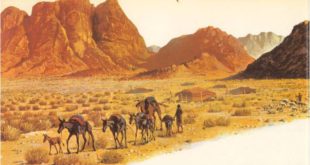In the last years of the fourth century B. C., Greek citizens going about their business in the stoas or the shops sometimes stopped and wondered what was wrong. Everything seems strange. They themselves had not changed and their cities looked the same as before, but the world around them was so different that they could hardly recognize themselves. The little poleis on the mainland looked out at an enormous empire, which stretched across Asia and Egypt. They shipped their olive oil and pottery across the Mediterranean. Their corn came from fields beside the Black Sea and the Nile. Merchants who crowded their market places now did business in Antioch and their sculptors had gone to Alexandria. There were new Greek cities, thousands of miles from Greece, where Asians spoke Greek and Greeks began to dress like the barbarians. There were no barbarians now, only the many sorts of people who shared a world which Alexandria had conquered for the Greeks. As the world the Greeks knew became larger, a man and his city seemed to become smaller. The Greeks began to wonder if there was a Greece at all any more. Athenians who travelled on business saw Athens in a new way when they came home. It was not very big and not very busy. When they went to the Assembly, the fine speeches had a hollow ring. In the old days, when Pericles or Themistocles spoke to the Assembly, things happened and the world felt the difference. Now, a man who spoke out in Athens might as well have dropped a pebble in an ocean. Alexander’s empire was much too big to be run by a group of citizens who talked over their problems in an Assembly. One man could rule it, if he was a king like …
Read More »The Silent Peninsula 3000 B.C. to 1600 B.C.
About 3000 B. C., when the Pharaohs ruled Egypt and Babylon was the home of mighty kings, bands of sailors set out from Asia Minor. They followed a little chain of islands that led northward across the unexplored sea that, centuries later, would be called the Mediterranean. If the islands had not been there, the sailors would never have dared to sail so far from home. Asia, the only world they knew, stopped at the eastern store of the sea. Some of the men were afraid that they might suddenly reach the end of the world and drop over it into nothing, but their captains ordered them to sail on. Their own countries were becoming crowded and it was important to find new lands. So long as another island lay ahead of them, it seemed safe to go on. At last, their ships did indeed come to the end of the sea — but it was not the edge of the world. The sailors sighted a new mainland. It was the mountainous peninsula that would be given the name of Greece. It was a strange and silent country of white stone peaks that disappeared into the clouds. Its thick forests of oaks and pines ran down to an oddly ragged coastline. The mountains, too, were jagged, as though an angry giant had smashed them. Gods and Giants Years later, the people of Greece told a story about evil giants who fought a great battle with the gods to see which of them would rule the earth. The giants were defeated and the gods locked them forever in a cave far under the ground, but the giants lived on, the storytellers said. When their anger took hold of them, they beat against the roof of their prison and the earth shook. …
Read More »The People of One God 3000 B. C. – 30 B. C.
On the plains of Mesopotamia, a young man stood gazing up at the stars that glittered from the dark sky of night. He was Abraham, a native of the Sumerian city of Ur. Abraham was a Hebrew, one of the many tribes of Semites said to have been descended from Shem, the son of Noah who had been saved from a great flood many years before. Like all people of his time, Abraham believed in many gods throughout nature. As he studied the pattern of the great stars for the god’s message, Abraham began to feel he was in the presence of a Lord God who was above all gods with idols and temples and sacrifices. Abraham felt, too, that this Lord God would take special care of those who lived up to his demands. Abraham became so devoted to this idea that years later he was inspired to leave Mesopotamia and start a new nation whose people would worship only the Lord God. With his family and tents and flocks, he made his way westward to the land of Canaan. After many setbacks, Abraham died there, content to know that his son Isaac would carry on the family. Isaac prospered and was followed by his son Jacob, whose life was such a struggle that he was honoured with the name Israel, meaning “struggler of god”. Jacob had twelve sons, each of whom founded a tribe and they and all their descendants became known as Israelites. One of Jacob’s sons, Joseph, became an important official in the Egyptian court and when a famine in the land of Canaan threatened to wipe out the Hebrews, they all joined Joseph in Egypt. This was the story told in the Bible and the traditions of the people who honoured Abraham, Isaac and Jacob …
Read More »


